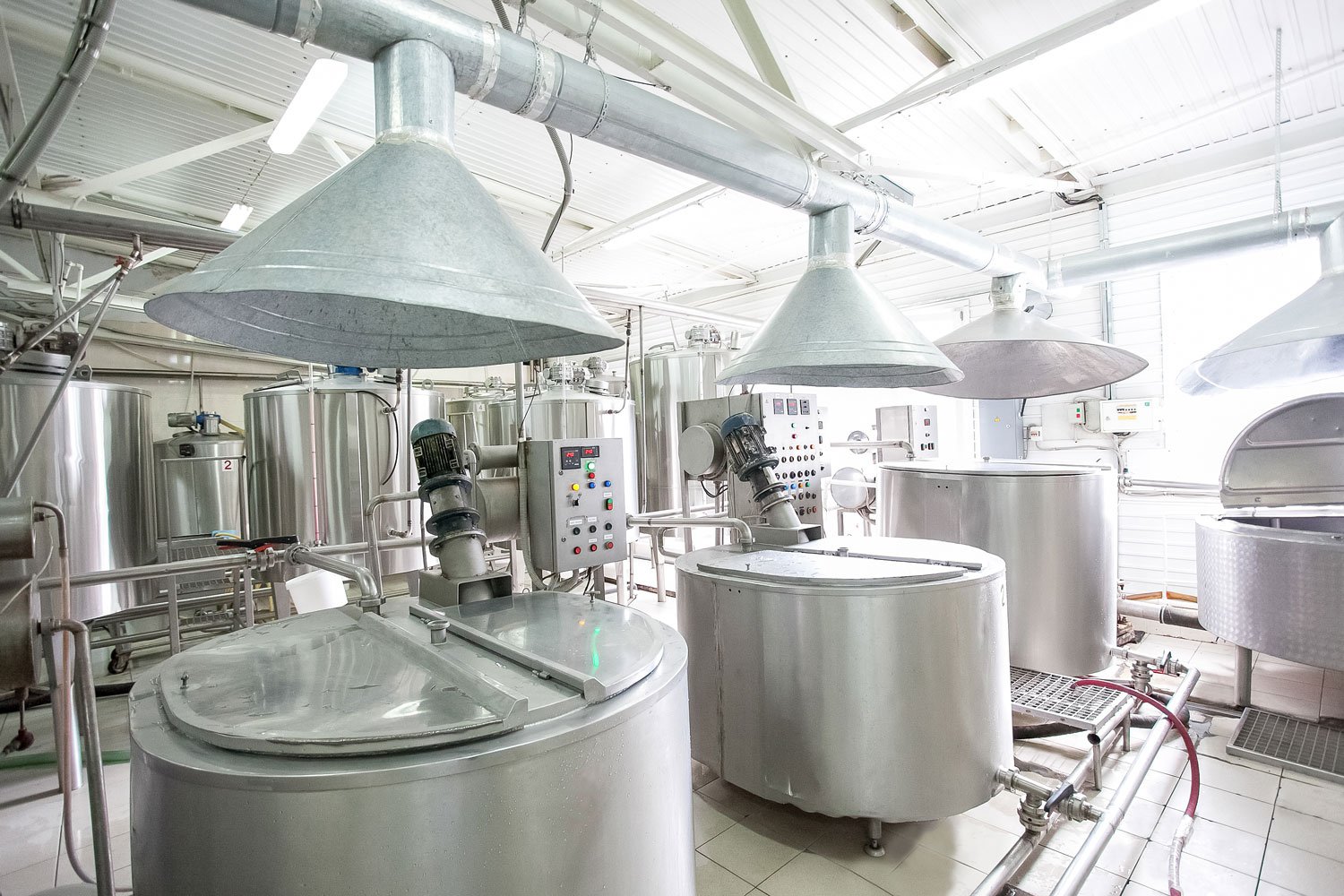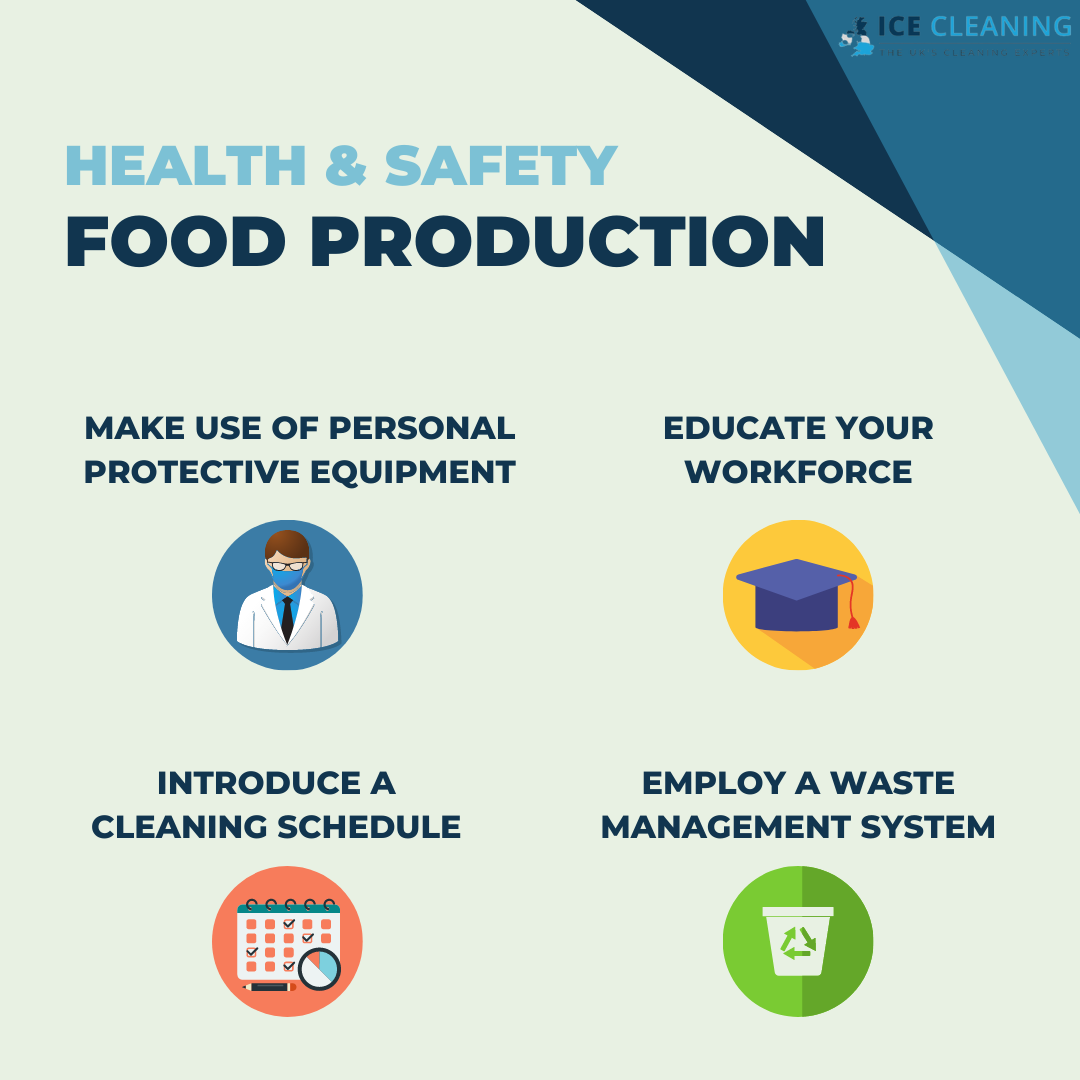How To Maintain Health & Safety Standards In Food Production Facilities

Why is food safety important?
Health and safety is important in any industry, however, failure to adhere to the necessary regulations can have devastating consequences for businesses operating in the food industry.
Those in the food industry are responsible for ensuring that the correct preventative techniques have been implemented to avoid outbreaks of bacteria and viruses in the workplace. Bacterial outbreaks can cause foodborne illnesses, such as salmonella.
Cross-contamination is a huge threat to food manufacturers, but can be avoided with the right measures in place. By adhering to industry health and safety regulations, you can minimise the risk of germs festering in your production plant.
How to implement health & safety regimes

Make use of personal protective equipment
All staff should be provided with the appropriate personal protective equipment (PPE).
Some roles will require more protective gear than others. Examples of PPE include:
- Face masks
- Uniform
- Goggles
- Gloves
- Safety boots
- Hard hats
After wearing such items, it’s important they are disposed of correctly. You should make it clear to your staff where to put each item after use.
Educate your workforce
One of the most important aspects of health and safety is educating your staff. If they don’t understand why certain procedures have been employed, how can you expect them to follow them?
Communication is vital. To make it simple, we’d recommend placing visual cues around the facility – such as signs on walls and floors. This will remind your staff of any new rules and prompt them to abide by routine measures.
To gain a thorough understanding of the importance of health and safety, you should hold regular training for your entire workforce. Not only will your staff feel valued, but they will be more willing to adopt any changes.
Health and safety training should focus on 2 key points:
The impact of their actions on the rest of the company
How do their duties affect business operations?
Are they complying with personal hygiene recommendations?
The risks associated with health and safety
Do they understand the importance of health and safety?
How can bad hygiene affect the company?
Good hygiene must be practised in all departments. All staff should be trained to understand the correct procedures for personal hygiene, daily cleaning, food preparation, food storage and waste disposal.
By taking the time to educate your employees, you can minimise the risk of health threats caused by human error in your food production facility.
Introduce a cleaning schedule
If you do not have a cleaning schedule in place already, it’s time to create one.
Your cleaning schedule should include both daily cleaning instructions for your staff and any external contracts with professional cleaning companies. Whilst a daily wipe-down of equipment is important, professional solutions are required to meet industry standards.
Professional cleaning experts will be able to carry out an unmatched deep cleaning service, providing peace of mind that all health and safety regulations have been achieved.
In light of the current pandemic, you should also consider regularly decontaminating your food production facility. Though there is not enough evidence to support the idea that food can carry the virus, food packaging certainly can.
Handling food and materials with gloves is simply not enough. Ideally, all surfaces and areas should undergo thorough decontamination at least twice a month.
Employ a waste management system
Did you know it is a legal requirement to safely dispose of waste?
A waste management system is required to minimise the accumulation of rubbish. Without efficient waste processes in place, food waste will build up. As the pile grows, it will begin to attract pests.
Pests can cause a wide range of issues for food production facilities. The main risk, of course, is food contamination.
Pests are disease-ridden and can cause issues for both your workforce and your products. Failure to control pests may put the health of your staff at risk or physically contaminate ingredients and food products in your plant.
Professional food production facility cleaning
The easiest way to ensure the correct measures have been taken is to hire a professional company to carry out the tasks. A professional cleaning company will have access to specialist tools and equipment, as well as industry knowledge and expertise.
Contact us
Here at ICE Cleaning, we provide both food production cleaning and coronavirus decontamination services. Our technicians have undergone intensive training and hold a range of professional industry accreditations, such as IOSH, IPAF and Safe Contractor.
Our food production cleaning service covers everything from lights, floors and ceilings, to windows, machinery and air vents. We can even work at height!
If you’re worried about the impact of coronavirus, look no further. Our coronavirus decontamination solution kills all live traces of the virus and creates a protective layer over solid surfaces. The solution is effective for up to 28 days, however, we’d recommend repeating the service every 14 days for maximum protection.
To find out more about either of our services, give us a call on 0208 066 0360 or email us on enquiries@icecleaning.co.uk.

Speak with me today,
I’m here to help
By asking you a few questions either via phone or email I can immediately provide a realistic estimation of the cost.
You’re in good company. We’ve cleaned for the following commercial clients… View all

Why choose us?
- Cater to a wide variety of cleaning situations
- Nationwide coverage, available 24/7
- Cater to commercial and domestic clients
- Free survey provided prior to quotation
- Emergency response team
- Offer a bespoke service designed to suit all your needs
- All technicians hold professional health and safety qualifications, including BICSc, IOSH, Dewpoint Professional & Safe Contractor
We’re fully accredited
We place best practise, professional expertise and health and safety at the core of our business. We’re fully compliant with all legal obligations. You can view a list of our accreditations below, or visit our Health & Safety page for more information.











-RGB-small.1707319151.jpg)




















